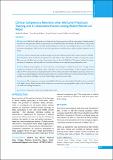Please use this identifier to cite or link to this item:
https://hdl.handle.net/20.500.14356/1026Full metadata record
| DC Field | Value | Language |
|---|---|---|
| dc.contributor.author | Bhusal, Madhab Raj | - |
| dc.contributor.author | Pakhrin, Jonu Tamang | - |
| dc.contributor.author | Chitrakar, Deepa | - |
| dc.contributor.author | Pradhan, Amita | - |
| dc.contributor.author | Tamang, Suresh | - |
| dc.date.accessioned | 2023-04-20T06:38:41Z | - |
| dc.date.available | 2023-04-20T06:38:41Z | - |
| dc.date.issued | 2022 | - |
| dc.identifier.citation | BhusalM. R., Tamang PakhrinJ., ChitrakarD., PradhanA., & TamangS. (2022). Clinical Competency Retention after Mid-Level Practicum Training and It’s Associated Factors among Health Workers of Nepal . Journal of Nepal Health Research Council, 20(01), 147-153. https://doi.org/10.33314/jnhrc.v20i01.3726 | en_US |
| dc.identifier.issn | Print ISSN: 1727-5482; Online ISSN: 1999-6217 | - |
| dc.identifier.uri | http://103.69.126.140:8080/handle/20.500.14356/1026 | - |
| dc.description | Original Article | en_US |
| dc.description.abstract | Abstract Background: Mid-level health workers are deployed in a large proportion with the expectation of similar patient outcomes as with physicians. Mid-level practitioners are Health Assistants and Auxiliary Health Workers who provide clinical care at remote locations. National Health Training Center has been providing 60 days in-service Mid-level Practicum training since 2009 AD for the mid-level practitioners with the aim to enhance quality of patient care in Nepal. Methods: An observational study conducted using retrospective data from onsite follow-up assessment of 180 Mid-level Practitioner from 18 districts of Nepal between July 2015 to June 2019. The retention of competency onsite follow-up was calculated as percentage of assessment score at the end of Mid-level Practicum training. Percentage retention of competency and association of retention with factors were analyzed using independent t-test. Results: Majority of participants were male (85.6%), and working in a Health Post (84.4%). Average clinical competency retention in each domain at their work place was 68.79% in knowledge, 73.80% in patient encounter skill, 82.84% in clinical decision-making skill and 87.58% in clinical procedure skill. Higher age groups, longer years of experience and participants from Terai region found to be associated with lower retention of knowledge. A better enabling environment and higher case load retained higher patient encounter skill. Conclusions: The competency retention among Mid-level Practicum trained mid-level health workers was found to be higher. Factors found associated with competency retention were age, geographic region, years of experience, case load and enabling environment. Keywords: Competency retention; knowledge; MLP; skill. | en_US |
| dc.language.iso | en | en_US |
| dc.publisher | Nepal Health Research Council | en_US |
| dc.relation.ispartofseries | Jan-March, 2022;3726 | - |
| dc.subject | Competency retention | en_US |
| dc.subject | knowledge | en_US |
| dc.subject | MLP | en_US |
| dc.subject | skill | en_US |
| dc.title | Clinical Competency Retention after Mid-Level Practicum Training and It’s Associated Factors among Health Workers of Nepal | en_US |
| dc.type | Journal Article | en_US |
| local.journal.category | Original Article | - |
| Appears in Collections: | Vol. 20 No. 01 (2022): Issue 54 Jan-March, 2022 | |
Files in This Item:
| File | Description | Size | Format | |
|---|---|---|---|---|
| 3726-Manuscript-27882-1-10-20220606.pdf | Fulltext Download | 594.72 kB | Adobe PDF |  View/Open |
Items in DSpace are protected by copyright, with all rights reserved, unless otherwise indicated.
